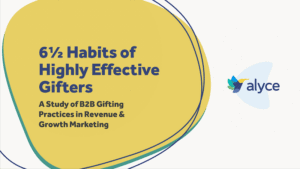2020
State of Gifting Report
What we learned from analyzing gifts that were sent in Q1-Q3 of this year
Introduction
If we had tried to prepare this report for you earlier in the year, we’d have a very different stance and outlook on the future of Corporate Gifting through the rest of the year and into next. Every month of this year brought about new challenges that marketing and sales teams worked through.
This year brought empathy into the spotlight and reminded us that everyone we do business with is a real person outside of their 9-to-5. A person who’s now living where they work, and working where they live. Whose new co-workers are pets or spouses or children or roommates that you can visibly see on calls.
2020 made us stronger as marketers and as sales professionals and brought back the human part of marketing and sales. We returned to the roots of what has always worked and re-learned what it meant to be empathetic.
And so as you’re preparing for the future and bringing along all the lessons that 2020 taught us, we wanted to compile a report that sums up everything we’ve learned about creating personal relationships at scale with personal gifting.
We sifted through data from 189,507 gifts that were sent from Q1 to Q3 of 2020 to give you insight on the way that leading companies today are thinking about leveraging gifting in their marketing and sales efforts.
The last thing we want is for you to send bad gifts. Like we mentioned in a previous Corporate Gifting Report, the corporate gifting industry has continued to separate itself from the people whom it was intended to please: the gift recipients.
We’re hoping this report helps you turn your view of corporate gifting back to the recipient, helps you create stronger bonds with everyone you do business with, and teaches you something new.
Enjoy!
01.
Driving Action, Not Just Attention with Corporate Gifting
When you’re thinking about your corporate gifting strategies, attention is rarely the KPI that VPs or C-Suite members are looking for in terms of ROI. What they’re looking for is action. Did the gift recipient take action once they received their gift? And the question on everyone’s mind is: what gifts will drive the most action from recipients?
Based on our cumulative data, we found that Speakers, Amazon Echo Dot’s, and Amazon Fire Tablets are the top three most popular gifts that drive action. You’ll notice in the table below that we noted the “Send Rank” of each gift and the “Meeting Rank” for each gift.
You’ll see that the gift that is sent the most is not the gift that drives the most action.
In fact, a majority of gifts ranked in the top 10 for driving meetings are not in the top 10 most sent list. That’s why we like to say that Amazon Gift Cards are really the least you can do when it comes to building relationships with your gifting. While Amazon Gift Cards are the most popular gift that is sent, recipients aren’t driven to act in the same way as they are with other gifts.
The gifts that drove the most action were gifts that drive a more emotional response. A speaker, a smart home, a way to read your favorite book on the go.
It’s not always the gift that drives the action, so if you are sending a more generic gift and want to drive action, make sure your gift message is relevant, relatable, and respectful.
Need any ideas on what to write in your gift messages? Check out our Gifting Templates here!
Top 10 gifts that are claimed that lead to a meeting booked - these are the gifts that were actually sent to the recipient who booked the meeting.




02.
Follow Up Matters
Finding your way into your prospect’s life with a gift is a moment you don’t want to get wrong.
When we analyzed the sent, viewed, and accepted rates of gifts sent in Q1-Q3 —a few data points stood out to us.
Based on cumulative data, gift recipients are 32% more likely to view their gift, and 64% more likely to claim their gifts on Saturdays.
Now this doesn’t mean that you need to be sending gifts to your prospects over the weekend. We don’t want you to be grinding away on your days off. What it does suggest is that the day you send a gift is not the day your gift recipient is going to view and accept the gift.
According to the data, on average it took gift recipients 8 days to claim a gift from the time it was sent.

Which leads us to this reminder: Following up with your corporate gifting campaigns is so important.
Sending a gift to a prospect is the first step in ensuring they see it, they like it, and they act on it.
Use that first week after hitting send to reinforce your value prop, remind your prospects about their gift, and encourage next steps through email, social media, and phone call follow up.
And if you do so, you’ll be standing out from the crowd.
58% of sales reps give up after a single attempt to connect.
Which means: The reps who go that extra mile to follow up with their prospects are the ones who book more meetings. Need some tips on perfecting your or your team’s follow up cadences, emails, and strategies? We’ve got you covered with our Art of the Follow Up ebook!
03.
Charitable Gifting Trends
2020 was really the perfect time to tap into everyone’s sense of giving. With donations coming out slowly at the start of the year, the impact of the pandemic and recent civil rights movement drove a sizable increase in charitable donations.
From February to March we saw a 380% increase in charitable giving, and another 50% increase from March to April. April was a record-breaking month, driving the most charitable giving in a month our team had ever seen.
Even after the initial bump in charitable gifting in March and April, we’re continuing to see really positive trends in the gifting and giving habits of our customers.
Charitable gifting is up 121.97% when you look at September compared to January.
Charitable gifters are widening the net of the unique charities that are being donated month over month, with 113% more organizations receiving donations in September compared to January.
Leveraging donation based giving to tap into everyone’s charitable side is a surefire way to show real empathy, build relationships, and create a memorable experience with everyone you want to do business with.
Thinking of running a charitable campaign and don’t know where to start? One of our rockstar CSMs put together this handy checklist for you so you get the most out of every single charitable campaign you run.




04.
Waste Not, Want Not
As much as we’d like to say that every single person who receives a gift is ready and willing to accept that gift, that’s not realistic. Not every gift that is sent is accepted or even wanted. That’s just a fact. There is no one marketing or sales campaign you run that will have a 100% success rate.
Historically speaking, direct mail and corporate gifting is expensive. You spend a lot of time and money trying to tie a gift back to a certain campaign only to have 65% of those gifts end up in the trash.
At Alyce, we like to think of things differently. We don’t want to penalize our customers because of the way the world works. Alyce’s digital-first approach to Personal Gifting gives our customers an advantage: The advantage of a gift invitation model.
Our gift invitation is structured so that a prospect is invited to accept, exchange, donate the dollar value of a gift, or simply not claim the gift that is sent to them in a digital-first format. That model is not only recipient centric due to the power of choice, but it’s sender centric as well.
Senders have the advantage of not paying for a gift until it is accepted by a user. That way, you only pay for the gifts that actually create relationships and drive action. If a gift is not accepted after a period of time that you set, it’s expired.
Due to gift expirations or gifts that simply weren't accepted by recipeients, each and every Alyce customer saved, on average
$69,492.90
in the first 3 quarters of 2020.
That’s almost $70k every single one of our customers did not have to spend on prospects who were not ready to take action.
With the legacy approach to corporate gifting that money would be gone, out the window, lost in your financial plans trying desperately to understand what the exact ROI of your direct mail campaigns are.
Those questions are automatically answered with Personal Gifting. Those who accept and claim your gifts drive action, those who do not accept or claim take no action, simple as that.
Conclusion
There’s something special about finding the perfect gift for someone, and opening a gift that feels perfect for you. There’s a bond that’s created between the gift giver and gift receiver and their relationship grows to become stronger.
We like to think that Personal Gifting with Alyce creates those moments between gift sender and gift receiver. And when moments like this are created in a business setting, generally between a sales professional and a future customer, action is taken to move the relationship forward.
See that’s the difference between Personal Gifting and traditional Corporate Gifting. While traditional Corporate Gifting focuses on grabbing prospects attention, it leaves gaping holes in the lead flow process and doesn’t create relationships or drive action. It’s a one-sided transaction that’s entirely sender-centric.
Personal Gifting isn’t about driving attention, it’s about creating relationships that drive action.
Personal Gifting leverages the power of choice so that recipients always receive a gift that they want or need, and nothing goes to waste.
And we have companies all around the continent who are turning towards a more personal way of doing business.
These companies, these people are changemakers in their industry, dead set on creating more delightful, personal experiences for their customers.
So we wanted to put this report together for you, the changemakers, to make your jobs easier.
We hope this information helps you become more personal in every way you’re doing business, drives more action with your future customers, and most importantly, helps you create relationships and personal bonds with everyone you’re doing business with.





